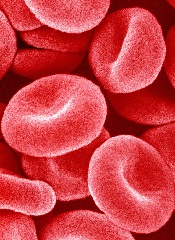
Recent studies have suggested that roughly half of patients hospitalized with traumatic brain injuries (TBIs) are anemic, but it hasn’t been clear how the anemia affects patients’ recovery.
Now, researchers have found evidence suggesting that low hemoglobin levels can negatively influence the outcomes of patients with TBIs.
The team detailed this evidence in a paper published in World Neurosurgery.
“More research is needed to develop treatment protocols for anemic patients with traumatic brain injuries,” said study author N. Scott Litofsky, MD, of the University of Missouri School of Medicine in Columbia.
“There has been a lack of consensus among physicians regarding the relationship of anemia and traumatic brain injuries on a patient’s health. Because of this uncertainty, treatment protocols are unclear and inconsistent. Our observational study found that a patient’s outcome is worse when he or she is anemic.”
The researchers studied 939 TBI patients with anemia who were admitted to a Level I trauma center.
The team assessed the relationships between patients’ initial hemoglobin level and lowest hemoglobin level during hospitalization at threshold values of ≤7, ≤8, ≤9, and ≤10 g/dL relative to their Glasgow Outcome Score within a year of surgery.
The data suggested that both initial hemoglobin levels and lowest hemoglobin levels were independent predictors of poor outcome (P<0.0001).
For each increase in initial hemoglobin level of 1 g/dL, the odds of a patient achieving a good outcome increased by 32%. For each increase in lowest hemoglobin level of 1 g/dL, the probability of a good outcome increased by 35.6%.
Female patients had worse outcomes than male patients if their initial hemoglobin levels were between 7 g/dL and 8 g/dL (P<0.05).
And receiving a blood transfusion was associated with poorer outcomes at hemoglobin levels ≤9 g/dL and ≤10 g/dL (P<0.05) but not at the lower hemoglobin thresholds.
The researchers said these data suggest clinicians may want to consider giving blood transfusions in TBI patients with hemoglobin levels of 8 g/dL or lower.
However, Dr Litofsky noted that the purpose of this study was not to propose transfusion guidelines. It was to determine the effects of anemia on TBI outcomes.
“Now that we have shown that anemia affects a patient’s recovery, further studies are needed to determine the best way to correct it,” he said. “The ultimate goal of this research is to help patients recover more quickly from traumatic brain injuries.”


